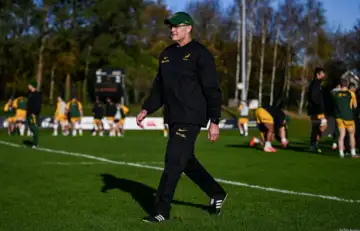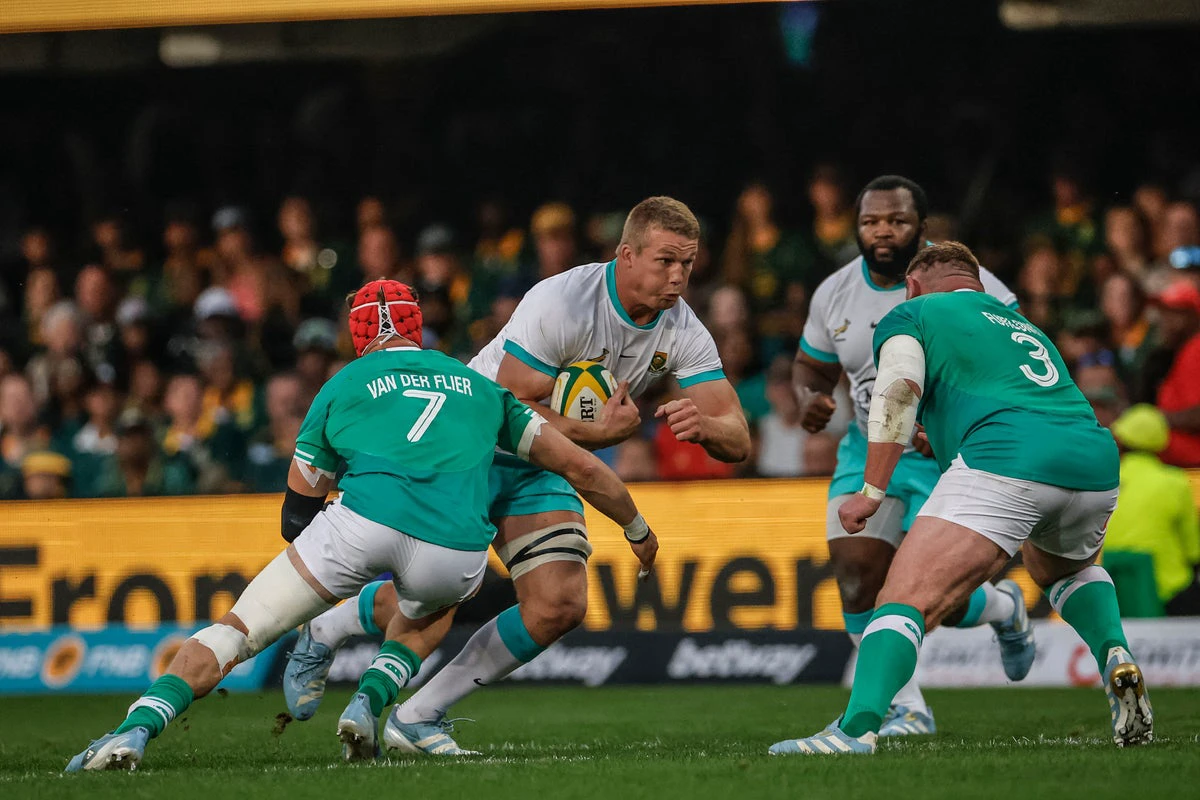It is funny how a narrative can develop. Two weeks ago, Ireland were a and in need of a major rebuild.
Andy Farrell, it was said, had failed to regenerate a champion side in time, leaving the days of Six Nations grand slams and World Cup contention behind them. An old-school scrap over the No 10 shirt along Leinster/Munster lines had not yet reached a satisfying conclusion; those moved on had not adequately replaced, while those elder statesmen that remained were no longer providing the impact required to compete at the top level. Forget the fact, for a moment, that many of those same individuals had just been – a crisis clearly loomed.
A win over an Australia limping over the line in a marathon year has clearly not cured all ills but there is a renewed sense of optimism around Ireland as they ready themselves for a meeting with the world champion Springboks. A few nagging concerns remain over the age profile of Farrell’s team, but, as top international coaches are fond of saying, things are seldom as bad as the commentariat might suggest they seem. This was, of course, a team that had lost twice in 2025 – however concerning aspects of their Six Nations defenestration by France and flat Chicago showing against New Zealand had been, a bad side, this clearly was not.
 An encounter with the Springboks is all the more fascinating given Rassie Erasmus’s side might, in a different world, be grappling with similar questions to Ireland. It was Erasmus himself who, helpfully, shared a now-deleted graphic on X (formerly Twitter) this week that illustrated that his side, in pure numbers, has an average age greater than that of their hosts this weekend, even with Canan Moodie on the wing instead of Kurt-Lee Arendse. This is no one-off, either – the starting XV deployed by South Africa in their win over France was a full 12 months older than that which Ireland fielded against the All Blacks.
An encounter with the Springboks is all the more fascinating given Rassie Erasmus’s side might, in a different world, be grappling with similar questions to Ireland. It was Erasmus himself who, helpfully, shared a now-deleted graphic on X (formerly Twitter) this week that illustrated that his side, in pure numbers, has an average age greater than that of their hosts this weekend, even with Canan Moodie on the wing instead of Kurt-Lee Arendse. This is no one-off, either – the starting XV deployed by South Africa in their win over France was a full 12 months older than that which Ireland fielded against the All Blacks.
 You will note that there have been rather fewer assertions that the back-to-back World Cup winners are over the hill, long in the tooth or senescent. Why? Well, winning obviously helps. A scattering of voices did opine in the wake of their Rugby Championship defeat to New Zealand that South Africa might soon count the cost of their overreliance on an ageing core, only for that group to be decisively, definitively .
You will note that there have been rather fewer assertions that the back-to-back World Cup winners are over the hill, long in the tooth or senescent. Why? Well, winning obviously helps. A scattering of voices did opine in the wake of their Rugby Championship defeat to New Zealand that South Africa might soon count the cost of their overreliance on an ageing core, only for that group to be decisively, definitively .
It helps, too, that the next generation are knocking more certainly on the Springboks door compared to Irish counterparts: for example, Sasha Feinberg-Mngomezulu has made a much smoother (in every sense) step up to Test level than the similarly tender Sam Prendergast – Prendergast may in time become the top fly half he has the tools to be but Feinberg-Mngomezulu is already there. There was something almost comedic about Ireland against Japan, however deserved Tom Farrell’s first cap was when it eventually earned.
 A structure like the one employed by Irish rugby, which is commendable in so many ways, is not necessarily best suited to the rapid development of younger talent. To have just four provinces and so incentivise top players staying in the country naturally blocks the development of some – take Paddy McCarthy, perhaps, with the loosehead only now starting to feature regularly for Leinster, having played a combined 135 minutes in the United Rugby Championship before this season. The trade-off, maybe, is to keep a greater proportion of proven Test talent in the country, and there is always a balance to be struck between the fresh legs and faces of youth and the wizened wisdom of experienced heads.
A structure like the one employed by Irish rugby, which is commendable in so many ways, is not necessarily best suited to the rapid development of younger talent. To have just four provinces and so incentivise top players staying in the country naturally blocks the development of some – take Paddy McCarthy, perhaps, with the loosehead only now starting to feature regularly for Leinster, having played a combined 135 minutes in the United Rugby Championship before this season. The trade-off, maybe, is to keep a greater proportion of proven Test talent in the country, and there is always a balance to be struck between the fresh legs and faces of youth and the wizened wisdom of experienced heads.
Providing opportunities for young players is not a problem unique to Ireland, but does, perhaps, exacerbate the natural challenges of rebuilding when they come. It took time, it is easy to forget, for Farrell to tweak and tool his team after taking over from a Joe Schmidt side that peaked too soon. If there is a sense that the 2023 World Cup – at which they beat the eventual winners – was their golden opportunity, with Caelan Doris, Dan Sheehan and co. coming into their prime, there is also surely reason to believe that Ireland will come again.
 There are times watching South Africa when one can feel that their pool of talent is almost bottomless, but replacing individuals like Eben Etzebeth and Siya Kolisi when the time comes will not necessarily be as straightforward as simply slotting someone in. Will that occasion be before another World Cup is fought for in Australia? Perhaps not, but it is an inexorable truth that it will one day come. It can be said, though, may give the Springboks an advantage in readying the next generation.
There are times watching South Africa when one can feel that their pool of talent is almost bottomless, but replacing individuals like Eben Etzebeth and Siya Kolisi when the time comes will not necessarily be as straightforward as simply slotting someone in. Will that occasion be before another World Cup is fought for in Australia? Perhaps not, but it is an inexorable truth that it will one day come. It can be said, though, may give the Springboks an advantage in readying the next generation.
You sense that the narrative around Ireland will rumble on regardless, yet a win this weekend will feel significant in re-establishing their status in the upper strata of Test teams. The Springboks, meanwhile, have not beaten Ireland in Dublin under Erasmus nor, really, put them to bed, splitting their July series last year, the aforementioned pool stage defeat. “I haven’t won at the Aviva as a coach, even with Munster,” their head coach said. “We played the Scarlets in the Pro12 final and we lost here, and when we played against Saracens in the European Cup we lost here, and I think we’ve coached here three times and we haven’t won here.
 “I want to fix this. No, it’s not revenge. It would be great for all of us to say we managed to get one in Dublin because they’ve certainly had our number in the last couple of games.”
“I want to fix this. No, it’s not revenge. It would be great for all of us to say we managed to get one in Dublin because they’ve certainly had our number in the last couple of games.”
